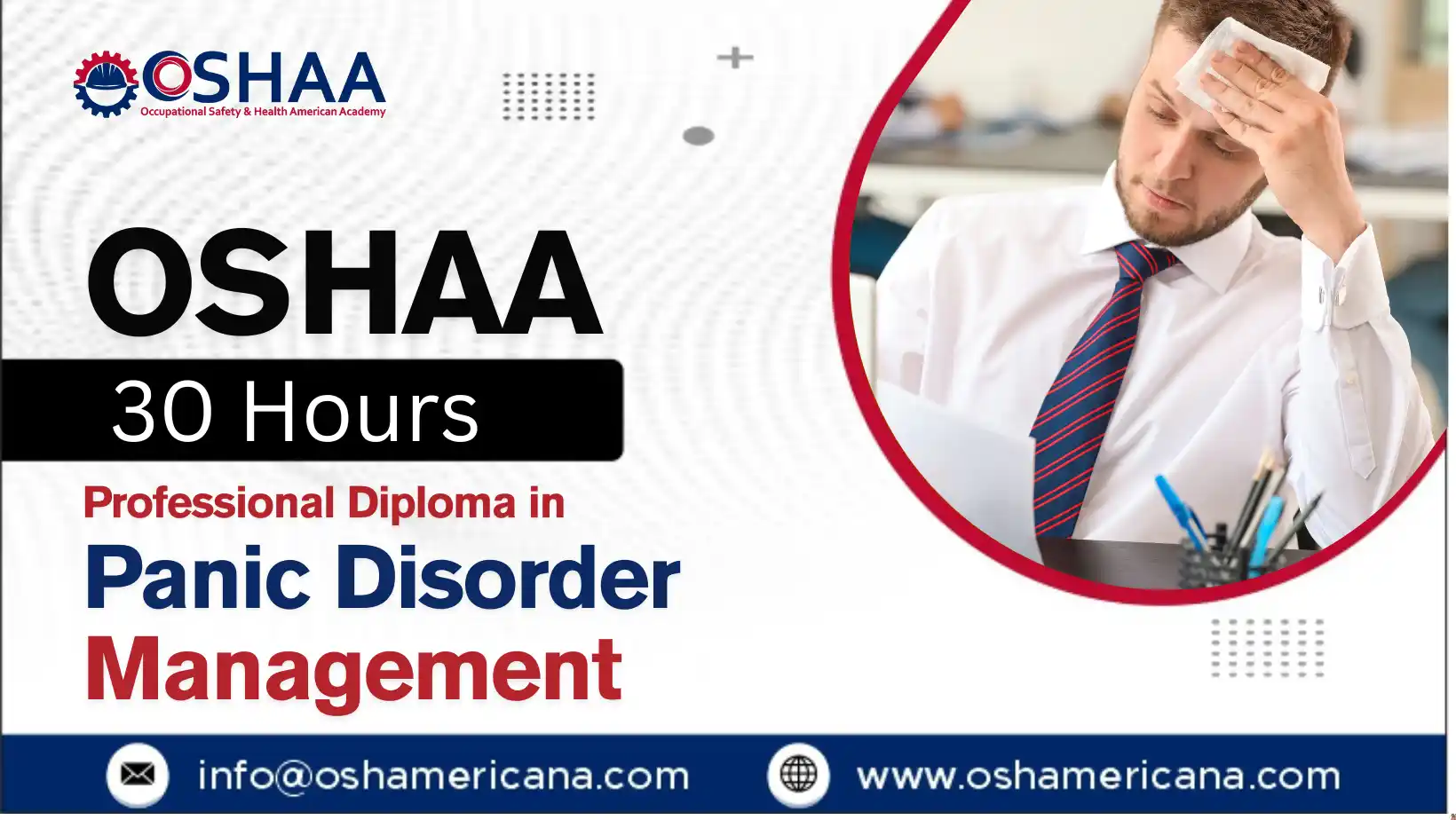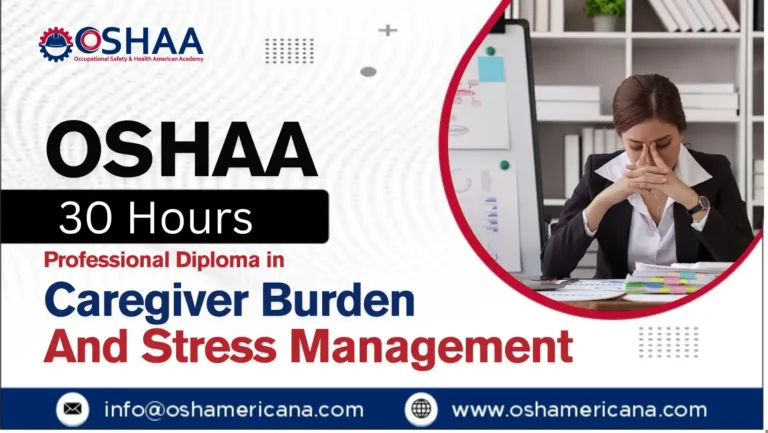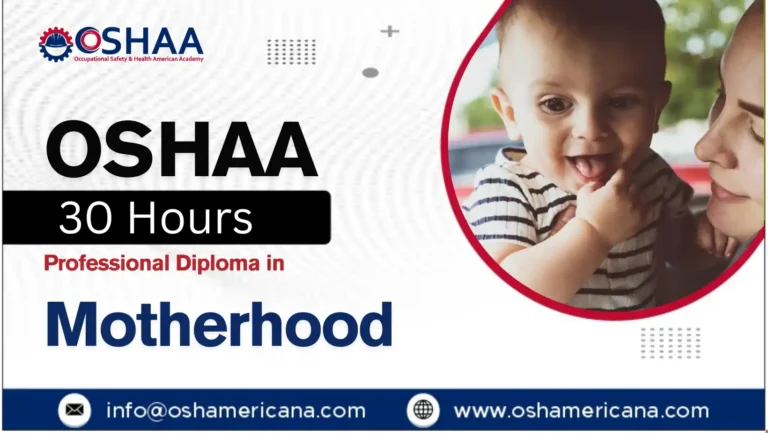Master Panic Disorder Management with Professional Diploma
Panic disorder is a debilitating mental health condition affecting millions worldwide, characterised by sudden, intense episodes of fear that impact daily functioning and emotional wellbeing. The OSHAA 30-Hours Professional Diploma in Panic Disorder Management provides a comprehensive, evidence-based training program to equip participants with the knowledge, skills, and practical tools to assess, manage, and support individuals experiencing panic disorder in clinical, educational, and community settings.
This diploma covers the psychological, neurological, and behavioural aspects of panic attacks and ongoing panic disorder. Participants learn to recognise symptoms and triggers, differentiate panic disorder from other anxiety conditions, and identify contributing factors such as trauma, chronic stress, and medical issues. The course emphasises early identification, accurate assessment, and validated screening tools to enable timely and effective intervention.
In addition, the program focuses on communication, reassurance, and support strategies. Participants gain confidence in responding to panic episodes, creating safe environments, and helping individuals develop coping mechanisms for long-term management. Delivered via a flexible online platform, the course is ideal for mental health professionals, educators, healthcare workers, and social support practitioners seeking practical skills and meaningful insights. The OSHAA 30-Hours Professional Diploma in Panic Disorder Management empowers participants to provide compassionate, effective, and confident care.
OSHAA 30-Hours Professional Diploma in Panic Disorder Management
Study Units
Learning Outcomes
Understanding Panic Disorder: Definition, Symptoms, and Impact (3 hours)
- Define panic disorder and distinguish it from occasional panic responses
- Identify key symptoms and diagnostic criteria for panic disorder
- Understand the personal, social, and occupational impact of recurring panic attacks
- Explore the emotional and psychological burden experienced by individuals with panic disorder
Causes and Risk Factors Associated with Panic Disorder (3 hours)
- Recognise biological, psychological, and environmental causes of panic disorder
- Identify common risk factors including genetics, trauma, and chronic stress
- Understand the role of life events and comorbid conditions in the onset of panic disorder
- Explore the relationship between vulnerability and the development of panic symptoms
Differentiating Panic Disorder from Other Anxiety Conditions (3 hours)
- Compare panic disorder with other anxiety-related conditions such as GAD, PTSD, and phobias
- Understand overlapping symptoms and key differentiating features
- Learn how misdiagnosis can occur and the importance of accurate assessment
- Gain clarity on the unique progression and presentation of panic disorder
Neurobiology and Psychological Mechanisms of Panic Attacks (3 hours)
- Understand the brain structures and functions involved in fear and panic responses
- Explore the role of the amygdala, autonomic nervous system, and stress hormones
- Identify how thoughts, beliefs, and behaviours contribute to the panic cycle
- Gain insight into the fight-or-flight response and its relevance to panic
Assessment and Diagnostic Tools in Panic Disorder Management (3 hours)
- Learn how to conduct structured interviews and use standardised diagnostic tools
- Understand clinical guidelines and criteria for identifying panic disorder
- Explore self-report questionnaires and symptom tracking tools
- Develop skills to assess panic severity and its impact on daily functioning
Cognitive Behavioural Approaches to Treatment (3.5 hours)
- Understand the core principles of cognitive behavioural therapy (CBT) for panic disorder
- Learn specific techniques including cognitive restructuring and exposure therapy
- Explore how CBT can interrupt the panic cycle and reduce symptom severity
- Apply CBT-based frameworks to create structured, personalised treatment plans
Crisis Intervention and Supporting Individuals During Panic Episodes (3 hours)
- Learn how to provide immediate, calm, and supportive responses during panic attacks
- Understand verbal and non-verbal communication techniques that reduce fear
- Explore grounding strategies and breathing techniques for real-time support
- Develop confidence in handling acute panic episodes in various settings
Medication and Pharmacological Considerations (2.5 hours)
- Identify commonly prescribed medications for panic disorder, such as SSRIs and benzodiazepines
- Understand the mechanism of action, benefits, and potential side effects
- Explore the role of pharmacological treatment alongside therapy
- Learn how to support individuals in understanding and managing their medication plans
Lifestyle, Diet, and Holistic Approaches to Panic Disorder (2.5 hours)
- Explore the impact of sleep, nutrition, and physical activity on anxiety and panic
- Identify lifestyle changes that support emotional regulation and nervous system balance
- Understand the role of mindfulness, relaxation techniques, and complementary therapies
- Learn how to guide individuals toward sustainable, wellness-based practices
Building Long-Term Coping Strategies and Relapse Prevention Plans (3.5 hours)
- Develop personalised coping strategies to maintain emotional stability
- Identify early warning signs of relapse and effective prevention techniques
- Explore the importance of self-monitoring, support systems, and routine care
- Learn how to empower individuals in building resilience and long-term self-management skills
- Gain an in-depth understanding of panic disorder, its symptoms, causes, and clinical impact
- Learn to differentiate panic disorder from other anxiety conditions with confidence
- Acquire practical skills in using evidence-based assessment and diagnostic tools
- Develop competence in delivering cognitive behavioural strategies to manage panic symptoms
- Understand crisis intervention techniques to support individuals during panic attacks
- Explore the role of medication and how it complements psychological therapies
- Learn how lifestyle, nutrition, and holistic approaches contribute to panic disorder management
- Build long-term support strategies focused on relapse prevention and emotional resilience
- Enhance your ability to work effectively in mental health, education, healthcare, and community support settings
- Achieve a professionally recognised qualification awarded by OSHAA, supporting your ongoing career development in the mental health and wellbeing sector
The OSHAA 30-Hours Professional Diploma in Panic Disorder Management is designed for individuals seeking to build professional knowledge and practical skills in the assessment and management of panic disorder. This course is ideal for:
- Mental health professionals aiming to deepen their understanding of anxiety-related conditions
- Healthcare practitioners looking to support individuals experiencing panic attacks
- Social care and community workers involved in emotional and behavioural support
- Educators and school-based staff working with young people affected by anxiety
- Wellness coaches and counsellors incorporating mental health awareness into their practice
- Crisis response workers and support staff who manage real-time emotional distress
- Participants interested in expanding their skills in evidence-based mental health strategies
This course is suitable for participants across a range of professional backgrounds who are committed to improving emotional wellbeing and delivering informed, compassionate support to individuals affected by panic disorder.







